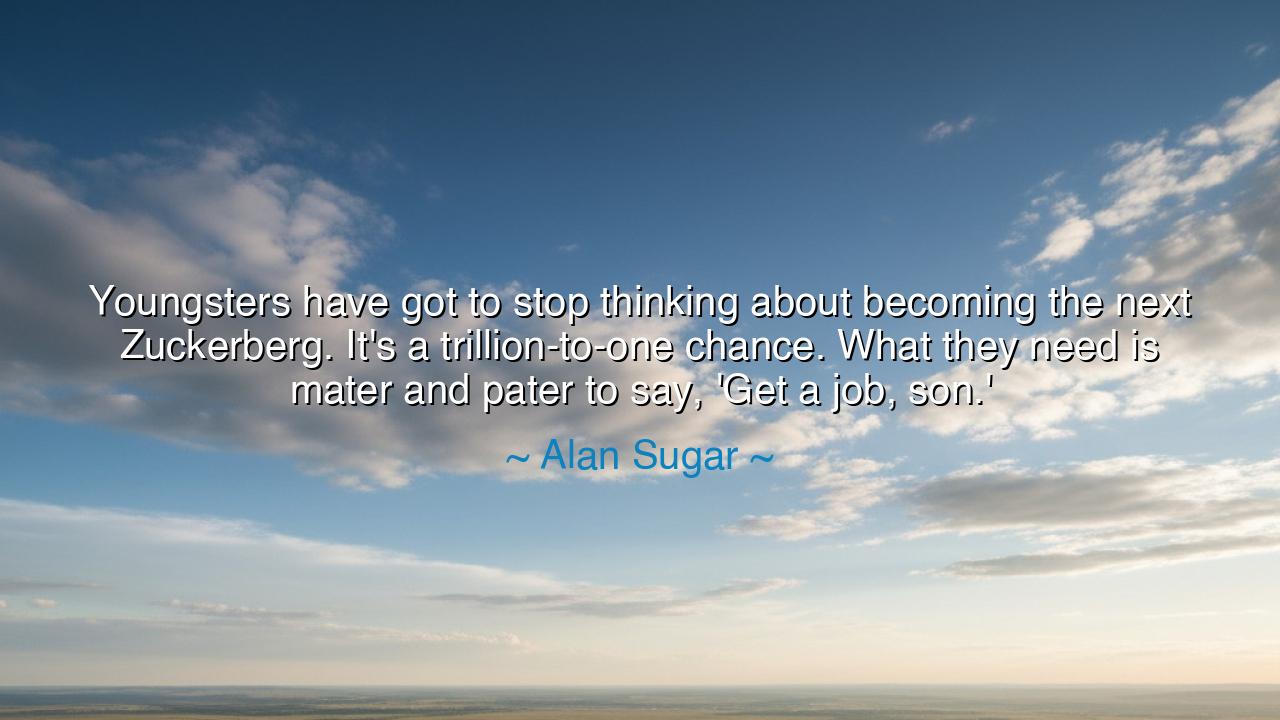
Youngsters have got to stop thinking about becoming the next
Youngsters have got to stop thinking about becoming the next Zuckerberg. It's a trillion-to-one chance. What they need is mater and pater to say, 'Get a job, son.'






In the words of Alan Sugar, "Youngsters have got to stop thinking about becoming the next Zuckerberg. It's a trillion-to-one chance. What they need is mater and pater to say, 'Get a job, son,'" we hear a call for realism, work ethic, and a return to the values of hard work and dedication that have long been the bedrock of human progress. Sugar’s reflection is not a condemnation of ambition, but rather a call for a shift in perspective—away from the fantasy of instant wealth and fame, and toward the practicality of building a sustainable and fulfilling life. His words remind us that true success is more often built through steady effort, resilience, and pragmatic choices, rather than through a stroke of luck or a highly improbable breakthrough.
Sugar speaks to the current obsession with tech moguls like Mark Zuckerberg, who became a billionaire by creating Facebook, and the idealization of their extraordinary stories. Yet, the truth is, for every Zuckerberg, there are millions of young people who seek to replicate that success but fail. This fantasy of becoming the next tech billionaire is akin to the ancient myth of Icarus, who sought to fly too close to the sun, believing that the dream of greatness would make him invincible. But, as in Icarus' tragic fall, many young people today are blinded by the allure of fame and riches, forgetting that such extraordinary success is often a rare accident of timing, luck, and circumstances, rather than the result of steady work and true merit.
In ancient Rome, the greatest emperors and philosophers did not dream of becoming rich from a single idea or invention. Rather, they focused on the pursuit of wisdom, discipline, and long-term strategies. Cicero, the great Roman statesman, believed that diligence and integrity in one’s work were the keys to a good life, not fleeting moments of sudden success. He taught that personal fulfillment and greatness come not from wealth but from the steady accumulation of knowledge and the persistence to improve oneself over time. Sugar’s call to young people to get a job and build from the ground up is rooted in this very ancient wisdom—work hard, build consistently, and you will eventually see the fruits of your labor.
Consider the story of Thomas Edison, the great American inventor who, despite facing numerous failures, continued to persevere with his experiments. Edison did not become the genius we know today through a single revolutionary idea, but through decades of hard work, trial, and error. His success was the result of a mindset that valued persistence over quick success. Just as Edison’s breakthroughs were the product of countless hours of labor, so too should young people today understand that true success comes through building skills, gaining experience, and contributing meaningfully to society over time.
Sugar’s emphasis on the role of parents in guiding their children toward steady, realistic work is a call for a return to foundational values—values that have served civilizations well for centuries. In ancient China, parents would often teach their children the value of perseverance and humility, traits that were seen as essential for success in life. They were taught not to chase fame or wealth, but to cultivate their abilities and contribute to society in ways that were meaningful and lasting. The lesson for today’s youth is not to discard their dreams, but to ground them in reality, understanding that true success is rarely the result of overnight riches, but rather the steady pursuit of excellence in one’s chosen field.
The lesson that Alan Sugar offers is one of balance. While ambition is important, it must be tempered with the understanding that hard work, practicality, and dedication are the true building blocks of long-term success. Instead of waiting for a chance to win the lottery of success, young people should focus on building their future step by step, through education, experience, and the development of skills that will serve them throughout their lives. In the end, the most successful among us are those who commit to their craft and never give up, understanding that greatness comes not from chasing fleeting dreams but from consistent effort and determination.
In our own lives, we must take this lesson to heart: we are all faced with the temptation of instant success in our modern world, but true fulfillment and success come from hard work, patience, and dedication. Like the ancient philosophers and inventors, we must recognize that our journeys to greatness are built one step at a time. Whether in our personal or professional lives, let us be reminded that the path to success is not a straight line, nor is it an overnight feat. It is a winding road paved with steady work, resilience, and a commitment to the values that will see us through the hardest of times. Let us take the long view, and build something that will last, for it is through slow and steady progress that we find true success.






AAdministratorAdministrator
Welcome, honored guests. Please leave a comment, we will respond soon